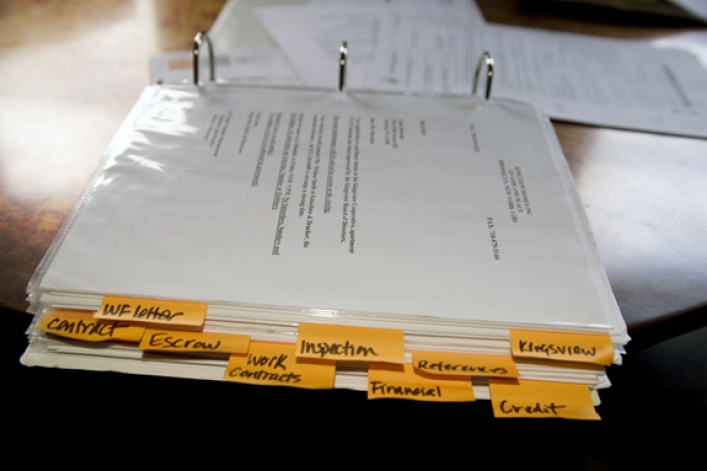How (not) to prepare a co-op board package

It was August 2012, a full nine months after I made my offer on Ashland Place, and I was feeling like I was at the end of a very long gestation.
I spent the summer gathering documents for Wells Fargo, the bank that agreed to finance my mortgage, and these ranged from income and bank statements to declarations of no credit (they wanted to assure I had not taken out additional credit).
It seemed I had to produce a document every time I sneezed, and then another explaining why I sneezed.
Just as I was on the verge of securing a commitment letter, Mary, my loan coordinator, told me the underwriters required a 25% down payment to bring my loan amount within the debt-to-income ratio.
That meant cutting into my renovation budget and reimagining my new kitchen. After hearing too many real estate agents say “it’s just an IKEA kitchen,” I had decided to invest in a modest but stylish kitchen from Home Depot, which priced out at about $12,000 in materials. For an 8 x 8 kitchen. Not including appliances or flooring. Or labor.
Now that I had to put down an additional $9,000, IKEA was looking more attractive. My friend Chris, who had just custom-renovated her own Classic Six kitchen, came along for advisement and measurement. After three hours, we created a good-looking scheme at about one-third the cost. How do you say “Hello, IKEA” in Swedish?
So, in mid-August, I had the mortgage, I had the plans and the seller’s lawyer had my down payment. Now all I needed was an invitation to the co-op party. The lease was running out on my Astoria apartment at the end of September. I pressed both my and the seller’s real estate agent for a co-op interview.
But it was my attorney who made the next call. On a mid-morning Thursday he told me the co-op board package was due on Friday.
I screeched. “How can that be? I need more than a day to put it together!” I was working on site for a client and couldn’t exactly walk off the job to assemble the 12 required binders.
“It’s in your contract that you will provide the full documentation within five days of receiving your commitment letter,” my attorney said.
As if I am reading my damn contract every week.
He refused to ask for an extension. I called Karen, my broker, and delivered the news.
She also noted “it’s in your contract.” I fumed. Big help, those two. While she thought about where I could meet her to deliver the documents, I ran down my list of what I still had to get: six recommendation letters, PDFs of financial statements from four personal and business accounts, documents of incorporation, paycheck stubs or evidence of work contracts. It was going to be a long night.
Miraculously, every recommender delivered, thanks mostly to me drafting letters for some of them. By the time I gathered all the documents and collated them with dividers, I had a four-inch stack. It was 2 a.m. and I was to meet Karen at Staples in five hours.
When I arrived, she greeted me with coffee and suggestions on how we’d divide up the copying. I stared at her. It was her job to assemble my board package and, trust me, that was in her contract.
We had a stare down in the copy center, each of us ready to fling our Starbucks cup at the other.
“I can’t get this done on my own with this short notice,” Karen said firmly. I seriously thought about ditching, and just when I was about to tell her, she stepped closer and said, “In a few hours you’ll be over the hump and on your way to a beautiful home.”
She leaned in her voice now syrupy, “Just tell yourself you’re qualified, you want this and you deserve this.”
I blanched and thought of Stuart Smalley affirmations. This was the person putting together my board application? I imagined smiley faces on the binders.
I called my client and explained I was stuck in Staples with a lunatic real estate agent and a stack of paper that had to be transformed into 12 pristine binders. Kindly, they wished me luck, which I was going to need.
Karen and I took over the copy center, which at various times looked like a studio charrette, a litigator’s conference room but mostly, a sight gag. Karen copied the tax returns so I could concentrate on the more complicated collations (I had 13 tabs: did I ignore this sign?) Even the simplest task went haywire.
First Karen punched holes in the right side of the pages (binders, of course, require holes on the left). She switched to pre-punched paper in the copier and made about 500 upside-down photocopies. She lost pages. I lost patience.
But what really got me was her mispronouncing my name. Ellie, she kept calling me. When I couldn’t find page two of a document—because Karen left the original in the photocopier—she said, “Ellie, you’re losing it.”
I stared at her, unable to hold my contempt. “You know what? It’s ELLE. After nine months, the least you can do is get my name right, especially if you’re going to collect a damn commission. It’s ELLE.”
She had the good grace to blush and stammer, “I’m sorry.” Then she added, “But you are losing it.”
We worked silently the next few hours, only necessary questions and short answers shooting across the copy counter. We peeled labels for the tabs. They were affixed crookedly.
She didn’t want to pay for nice binders; we ended up with cheap floppy Mylar. The shoddy presentation told the real story: while Karen tried to convince me of my qualifications, clearly, she herself lacked some kind of confidence in me.
It was 4 p.m. (!) when we finished. We packed the binders in a box and taped it to a fare-thee-well. Karen tried to show me how to use the tape gun. I tried not to shoot her.
It was pouring rain and Karen had to deliver the box to Fort Greene. We were in Chelsea. She wondered if she could make it by subway in time. I wondered if she was going to deliver soggy documents.
I stared at her. “Get a cab.” She flinched. Finally. Seemingly I got her where it hurt: her wallet.
“I think if you can just help me carry this down into the subway, I can make it,” she said.
I could have given her $20 for the cab, but something inside me resisted. If she didn’t make it to the co-op board on time, if the binders got soaked, I would take that as a sign that the apartment wasn’t meant to be.
By this time, I was used to looking for such omens.
Next: A home visit, and some bombshells at the board interview.
Elle Bee is a lifelong renter currently in the process of buying a Brooklyn apartment, recounted in her bi-weekly column, Diary of a First-Time Buyer.
Related posts:
What I learned from 150 apartments before I finally bought one
Here are 7 things your lawyer should tell you when you buy a condo or co-op in NYC (sponsored)
A single guy reveals why he took the co-op plunge -- and how he basically lives for free
Unraveling NY real estate spin--one white lie at a time
To pass your co-op board interview, read this first
16 things I wish I knew before buying this place
A NYC real estate lawyer reveals the 14 biggest surprises for first-time buyers (sponsored)
Confessions of a preconstruction buyer
The 7 worst places to live in a building
Your next place: 9 questions that separate the New Yorkers from the rookies

























